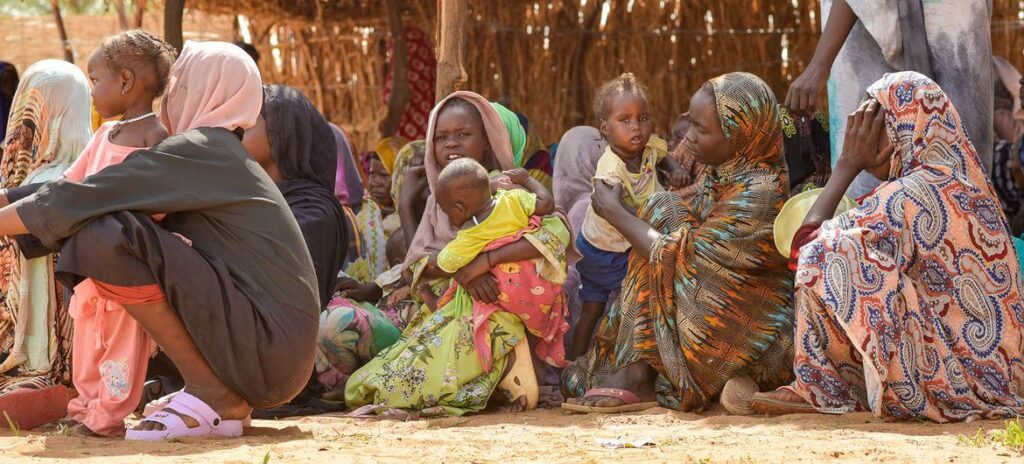Battle for Sudan’s El-Fasher Intensifies as RSF Claims Control of Army HQ
As violence escalates in Sudan, the city of El-Fasher has emerged as a critical battleground amid the ongoing conflict between the Sudanese Armed Forces (SAF) and the Rapid Support Forces (RSF). In a significant development, the RSF has claimed to have seized the military headquarters in El-Fasher, adding a new dimension to the power struggle that has engulfed the nation since the outbreak of hostilities. The claim comes as fighting intensifies, leading to a humanitarian crisis that is forcing residents to flee and raising alarms about the stability of the region. With strategic military positions changing hands, the international community watches closely, grappling with the implications of a potential escalation in violence and the impact on the lives of millions affected by the turmoil. As the situation unfolds, the stakes have never been higher for Sudan and its people, making the battle for El-Fasher a pivotal moment in the country’s tumultuous journey toward peace and security.
Intensifying Conflict in el-Fasher: Implications for Sudan’s Stability and Security
The intensifying conflict in el-Fasher, where the Rapid Support Forces (RSF) have reportedly taken control of the army headquarters, signifies a worrying escalation in Sudan’s ongoing turmoil. This power struggle not only destabilizes the region but poses serious implications for national security and governance. Local residents have witnessed sharp increases in violence and chaos, which have led to significant humanitarian concerns, including displacements and disruption of essential services. As the RSF rallies support, the conflict risks drawing in various factions, creating an even more fragmented political landscape.
The implications of this intensifying confrontation extend beyond el-Fasher to affect the broader stability of Sudan. Key repercussions include:
- Humanitarian Crisis: An influx of internally displaced persons seeking safety in already strained areas.
- Economic Downturn: The disruption of trade routes and local commerce undermines recovery efforts.
- Increased Military Engagement: A potential escalation in military operations could lead to more civilian casualties.
Understanding these dynamics is crucial for stakeholders attempting to navigate the future of Sudan amidst this deepening conflict, raising urgent questions about international intervention and peace-building efforts.
RSF’s Strategic Gains: Assessing the Impact on Military Dynamics in Sudan
The recent developments in Sudan’s el-Fasher have marked a pivotal shift in military dynamics as the Rapid Support Forces (RSF) assert control over critical military installations, including the army headquarters. This maneuver not only showcases the RSF’s growing strategic influence but also highlights a potential rebalancing of power within the region. Analysts suggest that the RSF’s success in seizing key military assets could lead to a redefinition of alliances and hostilities among various factions involved in Sudan’s ongoing conflict.
As the RSF consolidates its power, the implications for military operations are significant. Key points illustrating this impact include:
- Shift in Power Dynamics: The RSF’s takeover is likely to embolden its commanders and encourage further aggressive tactics against the Sudanese Armed Forces (SAF).
- Potential Escalation of Hostilities: Increased confrontations may arise as remnants of the SAF resist encroachment on their territories.
- Humanitarian Concerns: The ongoing fracturing of stability raises alarms regarding civilian safety and access to essential resources.
| Current Dynamics | Potential Consequences |
|---|---|
| RSF Seizes Key Installations | Reinforced confidence for RSF leaders |
| SAF Displacement | Increased conflict intensity |
| Humanitarian Aid Disruption | Worsened civilian crisis |
International Response and Humanitarian Considerations: Recommendations for Regional Stability
The deteriorating situation in el-Fasher necessitates a coordinated and robust international response to alleviate the suffering of civilians caught in the conflict. Humanitarian agencies must establish secure corridors to deliver essential aid, ensuring that food, medical supplies, and shelter reach those in dire need. It is crucial that the global community, including the United Nations and regional organizations like the African Union, enhance diplomatic efforts to mediate peace negotiations between the parties involved. A long-term strategy should include:
- Strengthening diplomatic engagements with a focus on inclusive talks that represent all stakeholders.
- Increased humanitarian funding to address immediate needs and support local NGOs working on the ground.
- Monitoring human rights violations to reinforce accountability and deter further violence.
Furthermore, fostering regional stability requires a comprehensive understanding of the socio-political landscape in Sudan. Engaging neighboring countries and regional powers is essential in creating a united front against the instability that threatens to spill over borders. Key recommendations include:
| Recommendation | Description |
|---|---|
| Regional Dialogue Initiatives | Encourage discussions among Sudan, South Sudan, and Egypt to address mutual security concerns. |
| Support for Refugees | Coordinate with international agencies to ensure safe passage and support for displaced populations. |
| Economic Assistance | Implement programs aimed at rebuilding Sudan’s economy to reduce the root causes of conflict. |
In Retrospect
In conclusion, the ongoing conflict in Sudan’s el-Fasher underscores the deepening rift between the Rapid Support Forces and the Sudanese Armed Forces, with significant implications for the region’s stability. The RSF’s recent claims of control over the army headquarters mark a pivotal development in this intensifying battle, raising concerns about the potential for further violence and humanitarian crises. As both sides appear entrenched in their positions, the international community watches closely, hoping for a resolution that respects the rights and safety of civilians amid the turmoil. The situation remains fluid, and the next steps taken by both military factions will be crucial in determining the future of el-Fasher and Sudan as a whole. As more information emerges, Al Jazeera will continue to provide updates and analysis on this evolving story.
